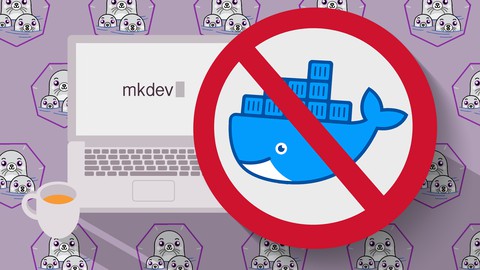
Dockerless: Deep Dive Into What Containers Really are About
Dockerless: Deep Dive Into What Containers Really are About, available at Free, has an average rating of 4.45, with 30 lectures, 2 quizzes, based on 54 reviews, and has 958 subscribers.
You will learn about Understanding of Open Container Standards Hands-on experience with new container tools Insights how containers work from inside Realisation that Docker is just one of container tools This course is ideal for individuals who are Developers and infrastructure engineers who want to better understand how Linux containers work beyond just Docker. It is particularly useful for Developers and infrastructure engineers who want to better understand how Linux containers work beyond just Docker.
Enroll now: Dockerless: Deep Dive Into What Containers Really are About
Summary
Title: Dockerless: Deep Dive Into What Containers Really are About
Price: Free
Average Rating: 4.45
Number of Lectures: 30
Number of Quizzes: 2
Number of Published Lectures: 30
Number of Published Quizzes: 2
Number of Curriculum Items: 35
Number of Published Curriculum Objects: 35
Original Price: Free
Quality Status: approved
Status: Live
What You Will Learn
- Understanding of Open Container Standards
- Hands-on experience with new container tools
- Insights how containers work from inside
- Realisation that Docker is just one of container tools
Who Should Attend
- Developers and infrastructure engineers who want to better understand how Linux containers work beyond just Docker.
Target Audiences
- Developers and infrastructure engineers who want to better understand how Linux containers work beyond just Docker.
When someone wants to say “tissue”, quite often they would say “Kleenex”. When someone wants to say “containers”, most likely they would say “Docker” instead.
We realise that “Kleenex” is just a widely accepted name for a particular type of a paper product. If we will see a tissue from another brand, we won’t get confused, we will still know what to do with it.
But is that the same with Docker? What do we mean by saying “Docker container”? Is it some generic container or is it something Docker specific? What about the “Docker image”? Do we know what the real tissue behind this is?
We’ve all been using Docker for so long that we stopped thinking “container” and instead we think “Docker”. In the Dockerless course you will learn to see beyond Docker – and try out a lot of new tools.
-
We’ll talk about open container standards and investigate them on practice by using half a dozen various container tools;
-
We will build container images and run containers – all without Docker;
-
We will also learn why you don’t need a container image to run a container, and why many big players, including AWS, RedHat and Google, move away from Docker – and what they rely on instead;
Course Curriculum
Chapter 1: Introduction
Lecture 1: Course prerequisites
Lecture 2: What's wrong with Docker?
Lecture 3: What is a container?
Chapter 2: Open Container Standards
Lecture 1: Open Container Initiative
Lecture 2: Skopeo
Lecture 3: Where container images are stored?
Lecture 4: Container Images
Lecture 5: Container Bundles
Lecture 6: umoci
Lecture 7: Container Bundle Deep Dive
Lecture 8: runc
Lecture 9: Running containers with runc
Lecture 10: runc applications
Lecture 11: Alternative OCI runtime: crun
Lecture 12: Container Standards Wrap Up
Chapter 3: Dockerless Tools
Lecture 1: Buildah
Lecture 2: Dockerfile vs Containerfile
Lecture 3: Building images with Buildah
Lecture 4: Rootless Containers
Lecture 5: Buildah applications
Lecture 6: Container Managers
Lecture 7: ContainerD
Lecture 8: Podman
Lecture 9: Podman Basics
Lecture 10: Podman Advanced
Lecture 11: Podman applications
Lecture 12: CRI and CRI-O
Lecture 13: CRI-O Hands-on
Chapter 4: Container Future
Lecture 1: Future of Containers
Lecture 2: Conclusion
Instructors
-
mkdev me
Public Cloud (AWS & GCP) and Cloud Native consulting -
Kirill Shirinkin
DevOps, Cloud and Infrastructure Expert
Rating Distribution
- 1 stars: 1 votes
- 2 stars: 1 votes
- 3 stars: 6 votes
- 4 stars: 12 votes
- 5 stars: 34 votes
Frequently Asked Questions
How long do I have access to the course materials?
You can view and review the lecture materials indefinitely, like an on-demand channel.
Can I take my courses with me wherever I go?
Definitely! If you have an internet connection, courses on Udemy are available on any device at any time. If you don’t have an internet connection, some instructors also let their students download course lectures. That’s up to the instructor though, so make sure you get on their good side!
You may also like
- Best Cybersecurity Fundamentals Courses to Learn in March 2025
- Best Smart Home Technology Courses to Learn in March 2025
- Best Holistic Health Courses to Learn in March 2025
- Best Nutrition And Diet Planning Courses to Learn in March 2025
- Best Yoga Instruction Courses to Learn in March 2025
- Best Stress Management Courses to Learn in March 2025
- Best Mindfulness Meditation Courses to Learn in March 2025
- Best Life Coaching Courses to Learn in March 2025
- Best Career Development Courses to Learn in March 2025
- Best Relationship Building Courses to Learn in March 2025
- Best Parenting Skills Courses to Learn in March 2025
- Best Home Improvement Courses to Learn in March 2025
- Best Gardening Courses to Learn in March 2025
- Best Sewing And Knitting Courses to Learn in March 2025
- Best Interior Design Courses to Learn in March 2025
- Best Writing Courses Courses to Learn in March 2025
- Best Storytelling Courses to Learn in March 2025
- Best Creativity Workshops Courses to Learn in March 2025
- Best Resilience Training Courses to Learn in March 2025
- Best Emotional Intelligence Courses to Learn in March 2025























